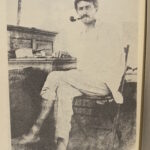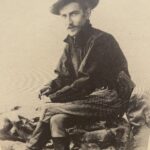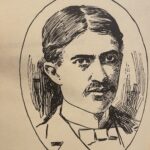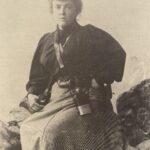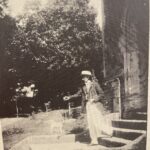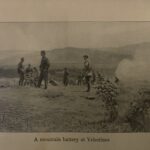Stephen Crane
While most notably known for his book “The Red Badge of Courage” Crane was also a war correspondent in the Turkish-Greco War of 1897 and the Spanish American War. Highly regarded by his audiences, some of his contemporaries such as Richard Harding Davis, were critical of his work in Greece, but very praising of his work in Cuba.
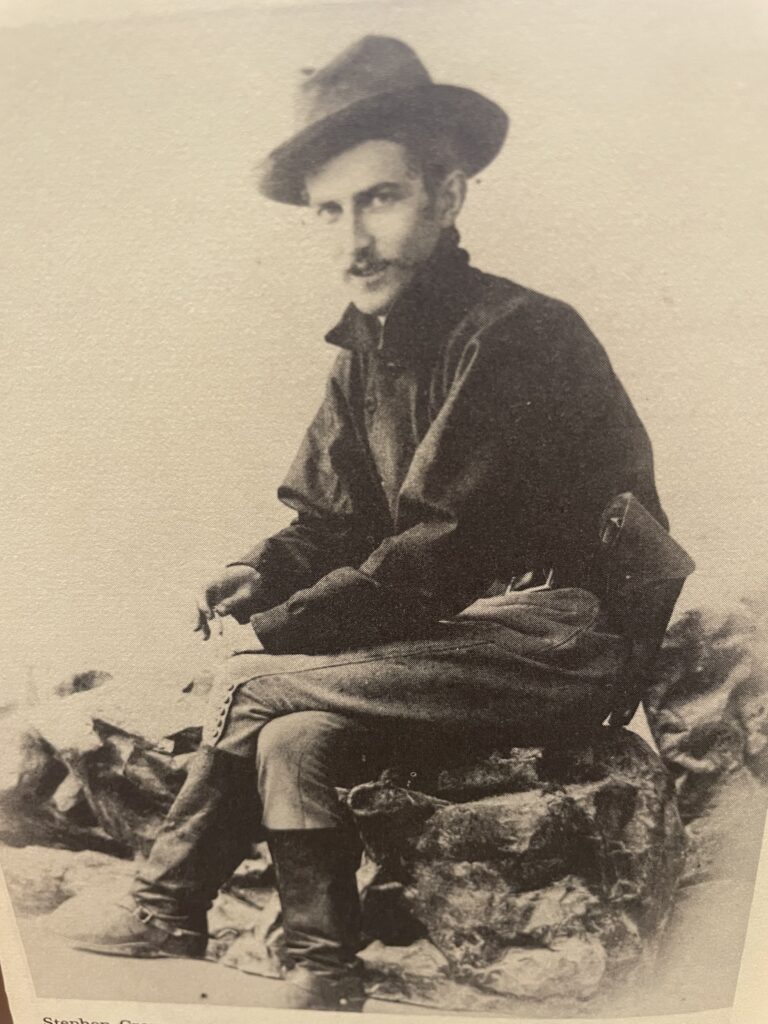
"He has not seen as much as I have for several reasons but then when a man can describe battles as well as he can without seeing them why should he care" Richard Harding Davis on Stephen Crane in Greece
Image Galery
“Mr. Crane easily led all the rest. Of his power to make the public see what he sees it would be impertinent to speak” Richard Harding Davis on Stephen Crane in the Spanish American War
Themes
Stephen Crane was born and raised a Christian man in the United States. His audience in both the United States and England, like him where Christian. It was seen as a marker of manhood and morality. His reporting of the Greco-Turkish War of 1897 was very obviously biases towards the European Christians of Greece versus the Muslim Turkish Army. Crane was trying to paint a picture of a Crusader like man when describing the Greeks in order to gin up support for the Greek army. There is a slight difference in his correspondents surrounding the Spanish American War. The Spanish, Cuban, and Puerto Rican fighters where all Christian, therefore in his correspondents he stays away from the Christian angle and reports more descriptive of a helpless Islander who cannot be fully trusted but is being saved, in Cranes eye’s, by the morally superior North American white man.
“There is a kind of government that can make every man a soldier but there is no government that can make every man desire to be a soldier…Ask any Greek on the street his opinion of the situation and he will say: “We must fight. There is nothing else to do.” Athens, Greece April 17th (The Works of Stephen), p 13
“To-day I went to a shop and found no one there but a boy seated on a box. “Where is the proprietor?” said I. “He has gone to the war,” said the boy. This man had taken no time to arrange his affairs in careful detail. He might have been gone out to buy a cigar in another shop. The shelves were stripped and the counters were bare. “The proprietor has nailed fast the lid of a great box in which are the things. I cannot sell you anything,” the boy said hastily. “I am going to the front.” Athens, Greece April 29th (The Works of Stephen,) p 15
“View ashore, Ponce, two miles from its little sea port, developed four striking things immediately-American buggies, naked babies, tree laden flaming crimson blossoms, and the enigmatic smile of the Porto Rican. They were all burning in the sunshie and dimmed by the white dust of a tropic city. They were all guarded by the American soldier, a calm, bronze and blue man with a bayonet. And herein lay the supreme interest, the interest of the juxtaposition of Michigan and Port Rico-Grand Rapids serenely sitting in judgement upon the affairs of Ponce. This made on marvel; this was the extraordinary situation that dazed the thoughtful American” Ponce, Porto Rico, Aug 7 (The Works of Stephen Crane), p 176
Crane’s views on race in the Greco-Turkish war are in one way pushing back on how the “Turk” and “Greek” have been stereotypically described by others up until that point. He did this by creating his own streotypes for the two groups. Yet still his description of the “Turk” is very much a form of Oreintalism, describing them as cuniving and untrustworthy. His descriptions of Cubans and Puerto Ricans is more explicitly aligned with the prevaling racist streotypes of lazyness, untrustworthyness, and monolith.
“Naturally then, this Turk was interesting. He didn’t care, however. He was rather tall and well made and had the face of a man, a man who could think, a man who could fight. He was fit for problems and he was fit for war, this fellow. The collar of his uniform was heavily flourished with gold and a sabre dangled to his spurred heels. He wore glasses, and about his eyes was the calm studious expression that one expects in professors at colleges. Unconsciously to us, perhaps, many of us have fashioned our idea of the Turk on this hang-dog photograph of the Sultan which has been reproduced everywhere. Probably this Turk was no nearer the controlling type, but the it was good to find him where one expected at least to find something fat and greasy.” An Impression of the Concert, (The Works of Stephen Crane) p 12.
“But it is now apparent that if anyone is strolling around Europe looking for a fight he can get it from the Moslem whose late victories from inferior Greece have stirred not only his military spirit, but more than that have fired anew his religious zeal” The Turkish Army, (The Works of Stephen Crane) p 80
“Anybody who has studied the negotiations between Turkey and Powers over what the Sultan shall be paid in money, land and national advantages for the victorious of his soldiers should see plainly that the Christian statesman of Europe is perfectly incompetent to play the game of diplomacy for one moment with the masters of the art at Constantinople. The Turk invariably makes a monkey and a fool of any white man who deals with him in these matters. History does not show a purely diplomatic victory over the Turk. This is almost proof that diplomacy is composed too much of lies and procrastination to be the high art which Europeans love to name it” The Eastern Question, Greece (The Works of Stephen Crane) p 75
“But there is no special deity for the people here. They are children of pellucid chance, and if Havana was a tub and they were a lot of rubber balls prancing and bouncing within they could not be more joyously irresponsible and incompetent.” Stepehn Crane in Havan Havana, Oct 3 (The Works of Stephen Crane) p 201
Crane was at the front lines of yellow journalism and caught not only in the wars of the Greeks and Turks and Spanish American, but also a social and corporate war between Hearst and Pulitzer. Crane was often critized for his lazyness in the field but his mastery of words and world building allowed him to pen pictures that captivated audiences.
“Back fell the Greek army, wrathful, sullen, fierce as any victorious army would be when commanded to retreat before the enemy it had defeated” Athens, Greece May 11th, (The Works of Stephen Crane) p45
“The bodies of Privates McColgan and Dunphy were found in the brush. Both were shot in the head. The large cavaties caused by the bullets, which inside a range of 500 yards have a rotary motion, indicate that they were killed at close range. Their bodies were stripped of shoes, hats and cartridges and horribly mutilated” Guantanamo June 12 In The First Land Fight Four of Our Men Are Killed (The Works of Stephen Crane) p 128
“The story of the mutilation of the bodies of the two young privates of Captain Spicer’s company of marines, which was sent in on Saturday last, is now found to be entirely untrue.” Guantanamo June 14th, Only Mutilated By Bullets (The Works of Stephen Crane) p 131
“The guerrillas were still lurking near the woods, and it was unsafe enough in the camp without venturing into the bush. Volunteers from Company C were called for and these seventeen privates volunteered: Boniface, Conway, Fitzegerald, Heilner, Harmson, Hemerie, Lewin, Mann, Mills, Monahan, Nolan, O’Donnell, Ryan, Riddle Sinclair, Sullivan,W.A., and Smith, J.H. They went under Lieutenant Lucas. They arrived in Nevill’s vicinity just as he and his men, together with Shaw and his men, were being finally surrounded at the close range. Lucas and his seventeen men broke through the guerrillas and saved save the pickets. and the whole body then fell back to Crest Hill. That is all there is to it.” Guantanamo, Cuba July 4th , (The Works of Stephen Crane) p153
Similar to his views on Customs & Morals as well as Race, Cranes politics where white, Christian and advocating for the U.S. full filling its role as an Empire with a sphere of influence around the world.
“Under the evil Spanish Government, Cuba might as well have been a desert. No matter the wealth in the soil or in the rocks, it was kept there by thieving Spanish officials, unless it came forth with oppressive and almost murderous levy. I knows this to be true. Everybody who knows the old life of Cuba knows that it was a life of officialdom, of corruption, ranging from petty bribes to grand gifts. This was true up to the very moment of the raising of the American flag on Morro Castle” Cuba, (The Works of Stephen Crane)
“Since this little Southern city has become the center of the filibustering industry in the United States there has been considerable excitement here of many different kinds. The town is really pro-Cuban in the most head-long fashion, and a rumor of an expedition can turn people out into the streets…The same lad who longs to fight Indians and to be a pirate on his own account longs to embark secretly midnight on one of these dangerous trips to the Cuban coast.” Jacksonville, Florida, The Works of Stephen
While Crane wrote from a clear supporting of the Greek army and support for U.S. troops “saving” the Caribbean from the Spanish, his descriptions of war where what made him famous. While his contemporaries like Richard Harding Davis and John Bass criticzed his work in Greece, Davis praised his work in Cuba. His correspondents on the battle at Velestino might be the most detached from the reality he wrote while also the most captivating pieces of written work he produced.
“He was a old school, and he thought the natives were soldiers of the old school. He had a vision of taking out his 25,000 or 30,000 men and meeting the native army…We groaned at this preposterous idea, and it is a sorry, sorry pleasure to find, soon enough, that we groaned for good reason….Major-General Lawton arrived at Manila in a subordinate capacity, he is understood to have remarked that 100,000 men would be a proper number for the occupation of the island. Lawton is one of the best soldiers in the American Army” July 20th 1898 Cuba, The Works of Stephen
“Under the evil Spanish Government, Cuba might as well have been a desert. No matter the wealth in the soil or in the rocks, it was kept there by thieving Spanish officials, unless it came forth with oppressive and almost murderous levy. I knows this to be true. Everybody who knows the old life of Cuba knows that it was a life of officialdom, of corruption, ranging from petty bribes to grand gifts. This was true up to the very moment of the raising of the American flag on Morro Castle” Cuba, The Works of Stephen
“The foreign warships naturally refused to assist the people to safety, but it seems to me that had a United States vessel been there Americans would have regarded such a course as the reverse of natural. The pleasant hypothesis by which the foreigners squared their consciences was that there was no need of flight” Athens, Greece May 11th, The Works of Stephen
Places Visited
“The decks of the Guardiana had been glad all day with the blue and gilt of the naval officers, and now in our experience and into this assemblage-behold the Turks! Around the ship lay the power of Christian Europe, and now here was the other thing-here was the Turk. Here was the creature that had pulled Europe’s nose, boxed its ears, kicked it downstairs and told it to go to the devil, all the time asking it to be quiet patient, that the creature was really governed by the most amiable impulses and all would be right in time, making it finally furious enough for deadly assault and then ending by harnessing it and driving it off gaily” April 26th 1897, “An Impression of the ‘Concert,'” The Works of Stephen Crane, 5
“In view of this fact, the Place de la Constitution in front of the royal palace has been interesting. At all hours of the day the victims who have come from everywhere to be robbed by the hotel-proprietors in the vicinity have been aroused by the blare of bugles, the great roaring of cheers of recruits mingled with loud approbation of the populace. There is one thing about a Greek crowd, it never howls. From descriptions of the modern Greek made by correspondents of London Conservative journals one rather expects him to howl. But he don’t howl; these crowds cheer in a deep-throated and meanful way that stirs the heart”April 17th 1897, “The Spirit of the Greek People,” The Works of Stephen Crane, 12
“Crowds are in the streets, in the square before the King’s palace and in every place of public congregation” April 29th, “Crane Says Greeks Cannot be Curbed,” The Works of Stephen Crane, 14
“One expects foreigners to have a universal trust in the intelligence of the American people in the face of these splendud exhibitions” May 1st “Greek War Correspondents,” The Works of Stephen Crane, 15
“When all these disappointed troops return to Athens what will they do?” “I do not know.” “Will they wreak vengeance?” “Perhaps.” “Upon whom?” “Upon the King.” June 1st 1897, “My Talk with ‘Soldiers Six,'” The Works of Stephen Crane, 58
“The journey from Arta overland to Thessaly requires a longer time than it does to go by the way of Athens,…” April 29th, “Crane Says Greeks Cannot be Curbed,” The Works of Stephen Crane, 14
(Crane travelled to Thessaly Greece with the Greek Army but did not write any correspondence in Thessaly)
When this war is done Velestino will be famed as its greatest battle…I know all Greece rejoiced, and this battle’s effect upon the Greek soldiers is like champagne. It made them perfectly happy. To be sure, the army retreated from Velestino, but it was no fault of this army. The commander bit his fingers and cursed when the order came to retreat. He knew that his army had victory within its grasp.” May 10th, 1897, “Crane at Velestino,” Works of Stephen Crane, 18
“We are carrying the wounded away from Domokos. There are eight hundred bullet-torn men aboard, some of them dead” On Board the St. Marina, Which Left Chalkis, Greece May 18, “Stephen Crane Tells of War’s Horrors”, The Works of Stephen Crane, 53
“The bodies of Private McColgan and Dunphy were found in the brush. Both were shot in the head. The large cavities caused by the bullets, which inside a range of 500 yards have a rotary motion, indicate that they were killed at close range. Their bodies were stripped of shoes, hats and cartridges and horribly mutilated” June 12 1898 “In The First Land Fight Four of Our Men Are Killed”, The Works of Stephen Crane, 128
“The story of the mutilation of the bodies of the two young privates of Captain Spicer’s company of marines, which was sent in on Saturday last, is now found to be entirely untrue” June 14, Only Mutilated By Bullets,The Works of Stephen Crane, 131
“The coast from Havana to Cabanas is high and beautifully wooded, with mountains in the background.” April 29 1898 “Sampson Inspects Harbor at Mariel,” The Works of Stephen Crane, 105
“Opinion and the direction of sympathy in the island of Hayti might at this time be of particular interest, since Hayti proximity to both Cuba and Porto Rico has rendered a singular experience of the Spaniard and his way” Porto Plata, Santo Domingo, May 15 1898 “Hayti and San Domingo Favor the United States” The Works of Stephen Crane, 115
“The native in the zone already ours is always quick to greet the American with a salute or with hat in hand. He cries out “Bueno!” Juan Diaz, Porto Rico, Aug 10 1898 The Porto Rican ‘Straddle'” The Works of Stephen Crane, 178
“People who contracted that neither France nor Russian would make a colonial move while the greatest colonist of them was busy in South Africa than ever she has been sinc the time of Napoleon may study with interest the move of Russia on Persia and the Persian Gulf” The Talk of London, The Works of Stephen Crane, 261
Stephen Crane died June 5th 1900 at 28 years old in Germany from Turberculosis that he had contratced during the Spanish-American War
